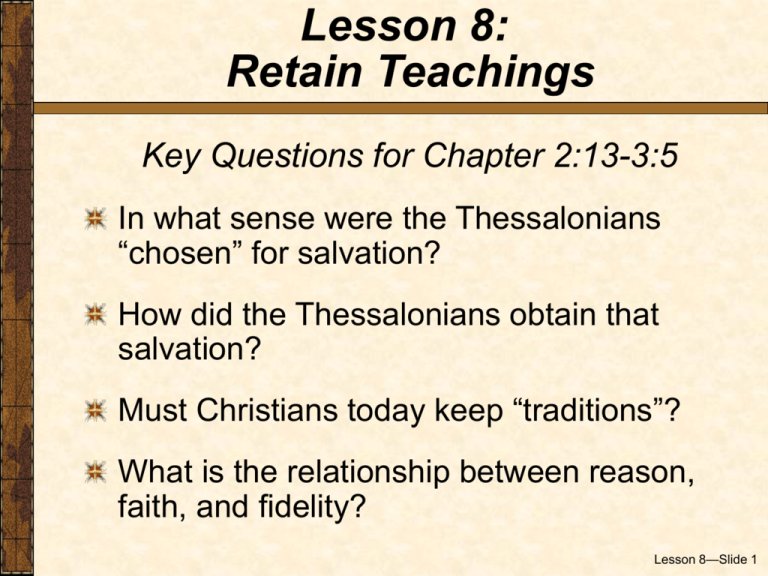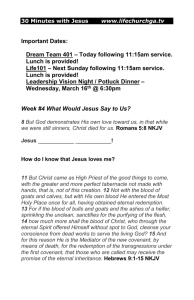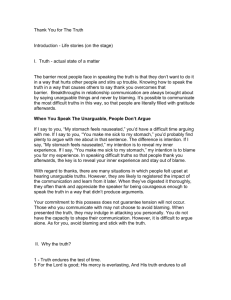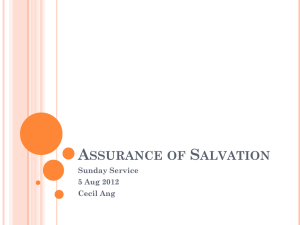thesles8
advertisement

Lesson 8: Retain Teachings Key Questions for Chapter 2:13-3:5 In what sense were the Thessalonians “chosen” for salvation? How did the Thessalonians obtain that salvation? Must Christians today keep “traditions”? What is the relationship between reason, faith, and fidelity? Lesson 8—Slide 1 In what sense were the Thessalonians “chosen” for salvation? Is the concept of “predestination” consistent with the following verses in this epistle? (2 Th 1:6 NKJV) since it is a righteous thing with God to repay with tribulation those who trouble you, (2 Th 1:8 NKJV) in flaming fire taking vengeance on those who do not … obey the gospel of our Lord Jesus Christ. (2 Th 2:10 NKJV) … those who perish, because they did not receive the love of the truth, that they might be saved. (2 Th 2:12 NKJV) that they all may be condemned who did not believe the truth but had pleasure in unrighteousness. Lesson 8—Slide 2 In what sense were the Thessalonians “chosen” for salvation?—Cont’d What is the difference between … (2 Th 2:13 KJV) … God hath from the beginning chosen you to salvation through sanctification of the Spirit and belief of the truth: And … (1 Th 5:9 KJV) For God hath not appointed us [destined us, NASB] to wrath, but to obtain salvation by our Lord Jesus Christ, or … (2 Pet 3:9 NKJV) The Lord is not … not willing that any should perish but that all should come to repentance. Lesson 8—Slide 3 How did the Thessalonians obtain that salvation? How is sanctification related to the truth? (2 Th 2:13 KJV) … God hath from the beginning chosen you to salvation through sanctification of the Spirit and belief of the truth: (John 8:32 NKJV) "And you shall know the truth, and the truth shall make you free.“ (John 17:17 NKJV) "Sanctify them by Your truth. Your word is truth. (1 Pet 1:23 NKJV) having been born again, not of corruptible seed but incorruptible, through the word of God which lives and abides forever, Lesson 8—Slide 4 Must Christians today keep“traditions”? What are “traditions”? paravdosi", ew", hJ handing down or over. 1.=betrayal, arrest —2. tradition, of teachings, commandments, narratives et al., first in the act. sense but in our literature only passive, of that which is handed: Bauer, Walter, Gingrich, F. Wilbur, and Danker, Frederick W., A Greek-English Lexicon of the New Testament and Other Early Christian Literature, (Chicago: University of Chicago Press) 1979. Lesson 8—Slide 5 Must Christians today keep“traditions”?—Cont’d Which “traditions” must the church keep/obey? Those originating from men? (Mark 7:9 NKJV) He said to them, "All too well you reject the commandment of God, that you may keep your tradition. (Mark 7:13 NKJV) "making the word of God of no effect through your tradition which you have handed down. … (Mat 15:9 NKJV) And in vain they worship Me, Teaching as doctrines the commandments of men.'" (Col 2:8 NKJV) Beware lest anyone cheat you through philosophy and empty deceit, according to the tradition of men, according to the basic principles of the world, and not according to Christ. Lesson 8—Slide 6 Must Christians today keep“traditions”?—Cont’d Which “traditions” must the church keep/ obey?—Cont’d Those originating from God? (2 Th 3:6 NKJV) But we command you, brethren, in the name of our Lord Jesus Christ, that you withdraw from every brother who walks disorderly and not according to the tradition which he received from us. (1 Cor 11:2 NKJV) Now I praise you, brethren, that you remember me in all things and keep the traditions just as I delivered them to you. (1 Cor 11:23 NKJV) For I received from the Lord that which I also delivered to you: that the Lord Jesus on the same night in which He was betrayed took bread; Lesson 8—Slide 7 What is the relationship between reason, faith, and fidelity? What was Paul’s “prayer request” about the spread of the gospel? (2 Th 3:1 KJV) Finally, brethren, pray for us, that the word of the Lord may have free course [spread rapidly, NASB], and be glorified, even as it is with you: (2 Th 3:2 KJV) And that we may be delivered from unreasonable and wicked men: for all men have not faith. Recall: For Paul, prayers always had a spiritual motive. Lesson 8—Slide 8 What is the relationship between reason, faith, and fidelity?— Cont’d Is it “reasonable” to have faith in the gospel? (2 Th 3:2 NKJV) and that we may be delivered from unreasonable and wicked men; for not all have faith. “Unreasonable” is “out of place; improper” (Rom 12:1 NKJV) I beseech you therefore, brethren, by the mercies of God, that you present your bodies a living sacrifice, holy, acceptable to God, which is your reasonable service. “Reasonable” is “rational; logical” Lesson 8—Slide 9 What is the relationship between reason, faith, and fidelity?— Cont’d Does having faith imply faithfulness/fidelity? (2 Th 3:2 NKJV) … not all have faith. (2 Th 3:3 NKJV) But the Lord is faithful, who will establish you and guard you from the evil one. (2 Th 3:4 NKJV) And we have confidence in the Lord concerning you, both that you do and will do the things we command you. (1 Th 5:24 NKJV) He who calls you is faithful, who also will do it. Who is always faithful? A faithful Lord is more than a match for men who do not have faith/fidelity. Lesson 8—Slide 10 What is the relationship between reason, faith, and fidelity?— Cont’d How do the “love of God” and the “patience/ steadfastness/endurance of Christ” help us to obey? (2 Th 3:4 NKJV) And we have confidence in the Lord concerning you, both that you do and will do the things we command you. (2 Th 3:5 NKJV) Now may the Lord direct your hearts into the love of God and into the patience [steadfastness, NASB] of Christ. Lesson 8—Slide 11 What to Remember From Chapter 2:13-3:5 God has “desired,” “appointed,” “destined,” “elected,” “chosen,” etc., all to be saved (through Jesus Christ). Salvation comes through obedience to God’s revealed truth. We should keep only the instructions that have God as their ultimate source (not man). It is reasonable and logical to have faith in God. Those who are really “full of faith” are faithful. Lesson 8—Slide 12







